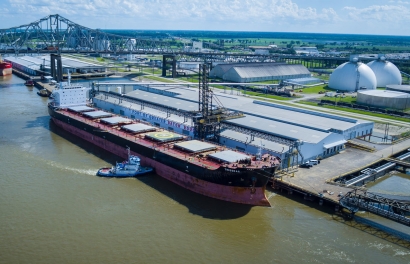
The planned facility, called Project Cyclus, will provide power for Fidelis’ state-of-the-art, 73,000-barrel-per-day Grön Fuels facility, which will produce sustainable aviation fuel, renewable diesel, green hydrogen, and bio-plastic feedstock with a net-negative carbon dioxide (CO2) footprint. Fidelis will sequester the biogenic CO2 in a carbon sink developed and secured by its subsidiary Capio Sequestration pursuant to the previously announced operating agreement between Capio and the State of Louisiana.
B&W will provide engineering, design, equipment, and technology services to support development of the biomass-fueled plant. The company’s B&W Renewable business segment will design and supply a 200-megawatt electric, biomass-fueled bubbling fluidized bed (BFB) boiler, while its B&W Environmental segment will provide its OxyBright™ oxy-combustion technology to isolate and capture CO2 for long-term sequestration, as well as a full suite of environmental technologies to control other emissions, including nitrogen oxides and sulfur oxides, particulate and volatile organic compounds.
The plant will utilize these technologies to produce clean energy with a net-negative carbon impact of over two million tons per year.
“We are excited to partner with Fidelis to provide our advanced technologies to assist in the development of green fuels that have a negative net carbon impact in the United States,” said B&W Chairman and Chief Executive Officer, Kenny Young.
“We are also in discussions with Fidelis on the creation of green hydrogen from biomass utilizing our Brightloop™ chemical looping process, which will revolutionize hydrogen production globally. We look forward to continuing our joint efforts with Fidelis to create green fuels for use around the world.”
“To design, develop and deliver our climate impact infrastructure systems at scale, Fidelis requires best in class strategic partners, and after significant work and diligence, we are excited to have selected and joined forces with Babcock & Wilcox and Kiewit as our technology and execution partners,” said Dan Shapiro, CEO and Co-Founder, Fidelis.
Bengt Jarlsjo, Co-Founder and COO of Fidelis, added, “Babcock & Wilcox, Kiewit and Fidelis through our RACER™ framework bring the optimal combination of cultures, proven technology, ESG-driven design and execution capacity to deliver carbon-negative power as the third component to the Fidelis flagship Climate GigaSystem™ - Grön Fuels.”
“We’re pleased to continue our long-standing relationship with B&W – this time working closely on a state-of-the-art project that will help Fidelis continue providing innovative green energy solutions in the U.S.,” said Tyler Nordquist, president of Kiewit Industrial.
“We’re looking forward to bringing our extensive engineering, procurement and construction experience and resources to this strategic partnership with B&W to safely deliver this important facility.”
“Our decarbonization solutions, including our OxyBright oxy-combustion technology, are proven technologies,” said B&W Executive Vice President and Chief Operating Officer, Jimmy Morgan.. “The Cyclus biomass and carbon capture project is an ideal way to utilize this efficient, effective, game-changing technology.”
“We believe that biomass energy with carbon capture and sequestration (BECCS) is a transformative approach to greenhouse gas reduction through carbon negativity. Our partnership with B&W and Kiewit offers us technologies and services that are efficient, flexible, and highly scalable. OxyBright will enable Cyclus and the Grön Fuels ecosystem to achieve carbon negative operation at unprecedented scale with proven technology,” said Byron Best, Senior Vice President and Chief Engineer of Fidelis.
B&W’s OxyBright technology is part of the company’s ClimateBright™ suite of decarbonization and hydrogen technologies. This oxy-combustion process, which uses pure oxygen for combustion, can be used with a broad range of fuels to produce a concentrated stream of CO2 ready for sequestration or beneficial use.
For the Cyclus project, the OxyBright process will use biomass fuel – including wood chips, wood waste, bagasse or other opportunity fuels – while captured CO2 will be sequestered underground.
B&W’s BFB boilers are well-suited to integrate with the oxy-combustion process and are designed to operate using a wide range of fuels, separately or in combination. The ability to utilize various fuel sources and types provides owners with the flexibility to take advantage of opportunity fuels and control fuel costs.

